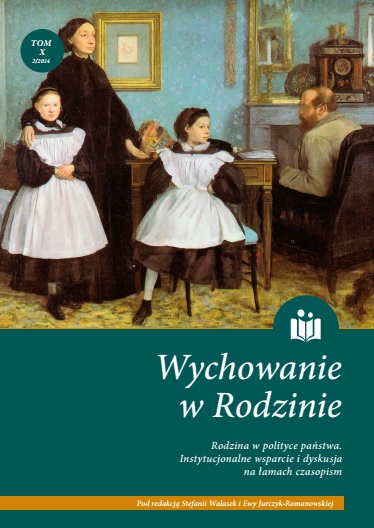Relacje rodzice – dziecko i ich prawne konteksty
The Parent-Child Relationship and it’s Legal Contexts
Author(s): Małgorzata DYRDÓŁSubject(s): History, Social Sciences, Sociology, Family and social welfare
Published by: Zakład Historii Edukacji w Instytucie Pedagogiki Uniwersytetu Wrocławskiego
Keywords: interpersonal relations; way of upbringing; parental attitudes; freedom; compulsion; parental authority; children’s sake; children’s rights; children’s subjectivity
Summary/Abstract: The subject of the dissertations in the article is law regulations relating to parents and their children, referring to parental authority on one hand and children’s rights on the other. The starting point for these dissertations is study of the parent–child relationship, including its types and ways of expression, cultural diversity and transformations through which this relationship has undergone. It is pointed out in the article how the perception of parental authority has changed and how it’s understood in the modern world (mainly in Poland). Basic principles on exercising parental authority are described including the principle of children’s sake and the public interest, the necessity of respecting children’s subjectivity and taking into account children’s age and maturity when making decisions which concern them. Attributes of parental authority were listed and custody over the child described. When discussing on institution of parental authority it was emphasized that this term is often misunderstood as well as the term “children’s sake” causing ambiguities. Parental authority is linked legally with children’s rights as natural rights, not given rights. The historical context of those rights is shown in the text with the emphasis put on children’s personal rights. In discussing the legal contexts of parent-child relationship it was highlighted that the law is only of ancillary importance for the adjustment of these relations. It is described how regulations refer to upbringing and partnership in interactions between adults and children. The text ends by pointing out the significance of knowledge and beliefs (of parents and their children) on children’s rights and parental authority for developing a parent–child relationship. Consequently, this significance results in the need to study this knowledge and these beliefs.
Journal: Wychowanie w Rodzinie
- Issue Year: X/2014
- Issue No: 2
- Page Range: 281-296
- Page Count: 16
- Language: English, Polish

